- Close friends and sisters among nine skiers who died in California avalanche
- Peter Mandelson Arrested on Misconduct Charges: Latest Updates and Reactions
- Hungary vetoes €90 billion loan for Ukraine, prompting strong EU rebukes
- How we measure media bias and framing
- Nick Reiner, son of Rob Reiner, enters not guilty plea in parents’ murder case
- European Parliament rejects Patriots for Europe’s minute of silence request
- New York City Under Emergency as Massive Snowstorm Disrupts Travel and Services
- Peter Mandelson Arrested for Misconduct: What You Need to Know
UK-US deal was made by Brexit | Paper Talk UK
Bias Exposure
The UK-US deal leads most of the newspapers this morning – the reaction is mixed with some praising the move and others disappointed that the flat 10 per cent levy remains.
Both the UK and US have offered limited details about the new trade deal, which they say is still being worked out. But if anyone is hoping the White House will roll back its tariffs they are set to be disappointed.
The 10% levy is to remain in place for the UK (and likely the rest of the world that is lining up for their deal).
The plans announced yesterday mostly amount to the White House walking back on some import taxes such as on cars and steel and the UK allowing more sales of American beef, ethanol and other agricultural products in the UK.
The Guardian says Pakistan has vowed to strike back after the Indian attack killed dozens of people. The paper says there are concerns that the strikes could escalate into a full-blown war. It speaks to Pakistan’s deputy prime minister Ishaq Dar who is quoted as saying his country would go to “any extent” to defend its dignity after the deadly air strikes.
EXPLAINER
Causal framing – Suggests a direct cause-effect relationship (“was made by Brexit”) without providing supporting detail, simplifying complex political negotiations.
Political bias – Implies a positive outcome of Brexit, which may align with pro-Brexit narratives and influence reader perception.
National pride – Highlights a potential achievement linked to British sovereignty, appealing to nationalist sentiment.
Lack of nuance – Omits context about the deal’s content, terms, or challenges, leading to a potentially misleading impression of success.
Loaded implication – Positions Brexit as a productive force, subtly reinforcing a political agenda without overt argument.
Authoritative tone – States the claim as fact, discouraging critical scrutiny or alternative interpretations.
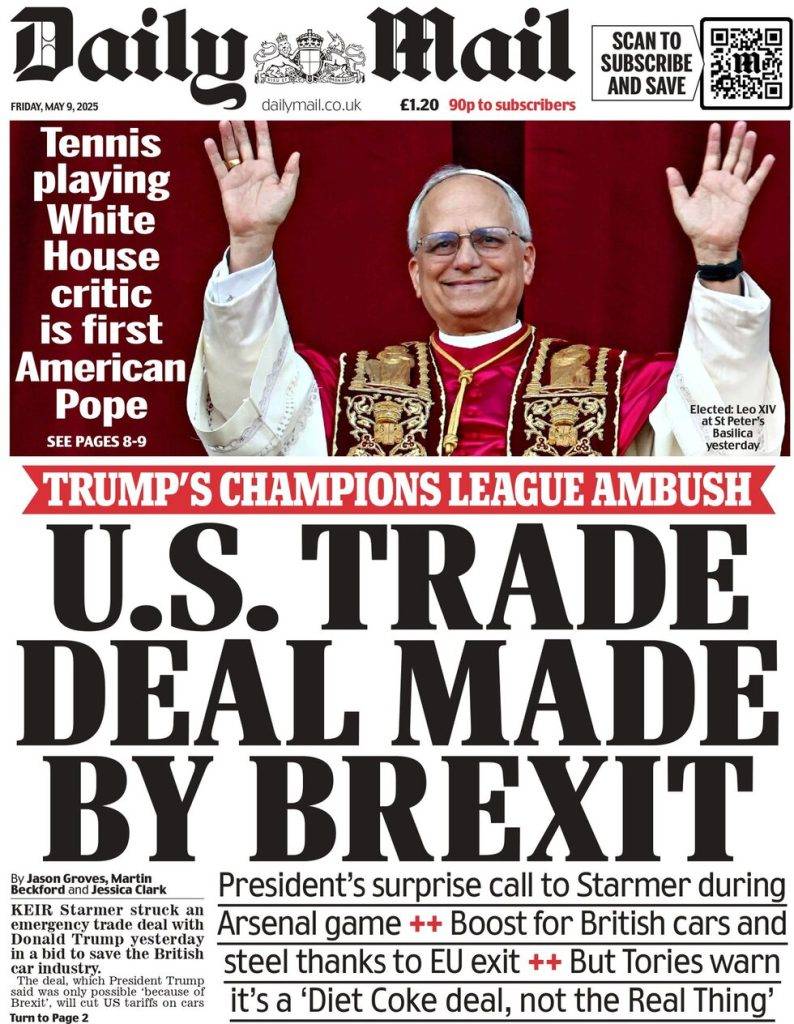
Financial Times reports that the prime minister is the first to seal a deal with the United States since Donald Trump unleashed his tariffs war on the world. The paper says the UK “has won” concessions on car and steel exports but “failed” to reverse a flat 10% levy on most goods.
EXPLAINER
Conflict framing – “Trump war” is a vague but charged phrase, invoking past political tension or turmoil to heighten drama.
Hero framing – “Starmer seals” presents him as a decisive actor achieving a breakthrough, reinforcing a positive image.
Emotive language – The use of “war” adds unnecessary drama, potentially skewing perception of past US-UK relations.
Temporal framing – Linking the deal to a significant past era (“since start of Trump war”) creates a sense of historic importance or recovery.
Political contrast – Implies a shift or improvement in diplomacy under Starmer, subtly contrasting him with previous leaders.
Ambiguity – “Trump war” is not clearly defined, leaving interpretation open and possibly misleading depending on reader bias.
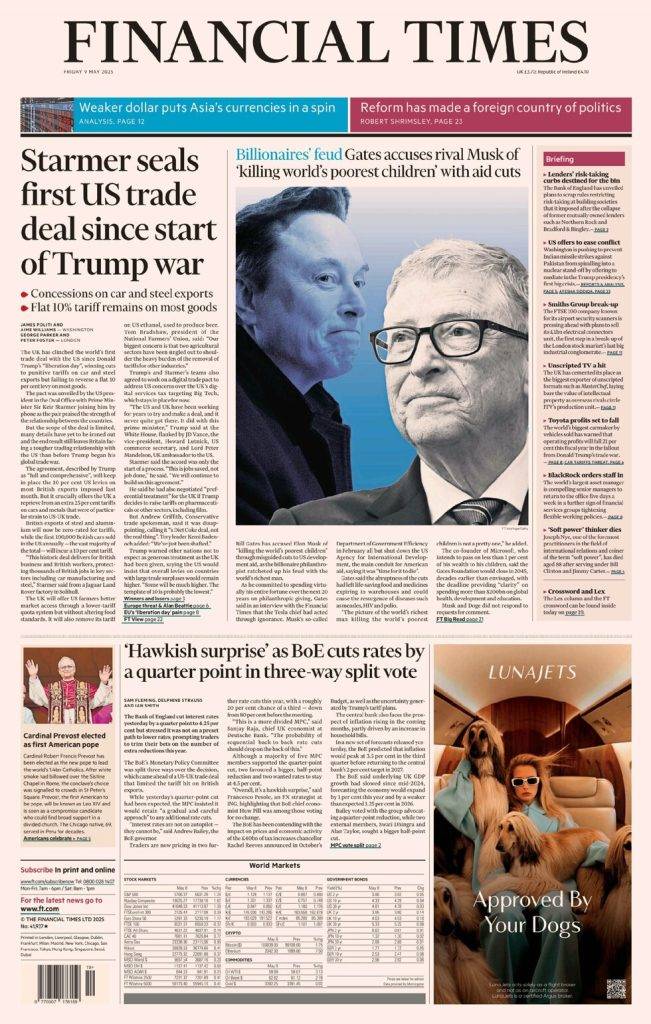
The Times says the historic deal means the prime minister can “boast of jobs saved” whilst President Donald Trump gets “better terms for beef and ethanol.”
EXPLAINER
Positive framing – “Hails” suggests celebration and success, casting the Prime Minister in a favourable light.
Emotive language – The word “historic” is loaded with significance, implying major achievement regardless of actual impact.
Authority bias – By quoting the Prime Minister directly, the headline lends weight to their perspective without critical analysis.
Lack of detail – No information is provided about the deal itself, making the headline more about image than substance.
National pride appeal – Emphasises a diplomatic success on the world stage, reinforcing a narrative of national competence or strength.
Promotional tone – The celebratory wording can function like political messaging, shaping public perception in favour of the government.
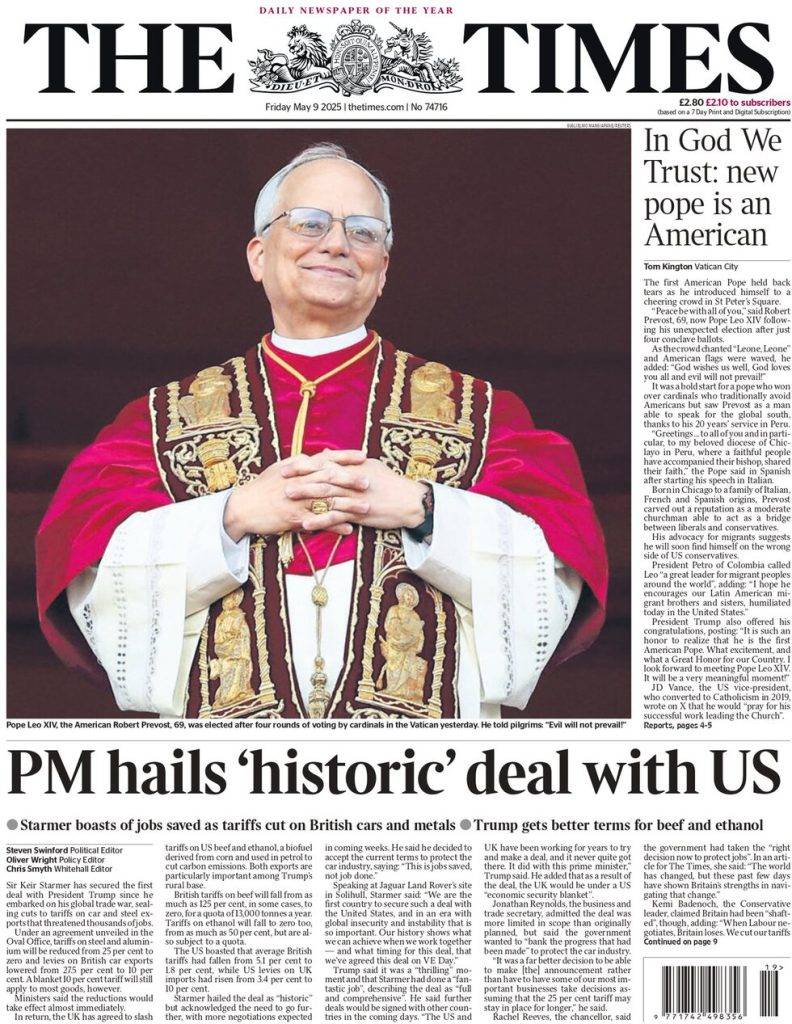
The Daily Telegraph says it has learnt that under the terms of the deal, the US can “object to Chinese firms investing in the UK.” The paper says the Tory party says this amounts to a “veto” – something the government’s spokesperson has dismissed as “categorically untrue.”
EXPLAINER
Conflict framing – Suggests tension in international relations, especially involving China, a key global power.
Negative connotation – “Hands US ‘veto'” implies a loss of British control or sovereignty, evoking concern or criticism.
Loaded language – “Veto” is a strong, politically charged term, often associated with power imbalance and domination.
Implied weakness – The wording portrays the Prime Minister as yielding to US influence, potentially undermining national authority.
Absence of context – The nature and scope of the “China deals” are not explained, which may lead to assumptions or misunderstanding.
Dramatic simplification – Complex international agreements are reduced to a simple, provocative claim, heightening emotional reaction.
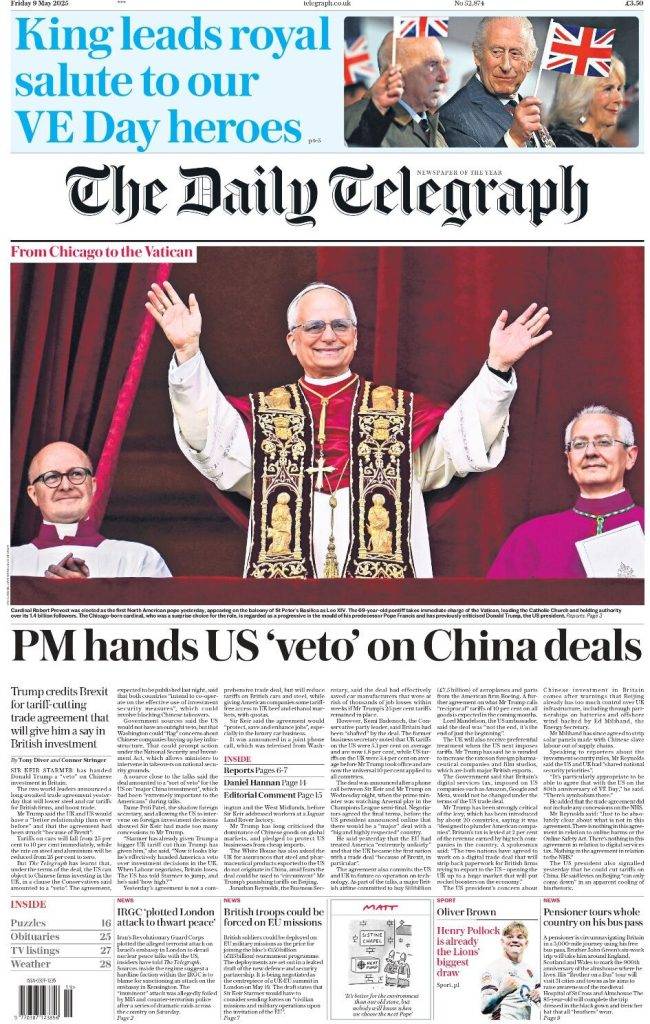
The Daily Star has a typical humorous take on the news saying the “future is orange” alongside an image of Donald Trump’s orange face. It also highlights an old tweet from David Lammy who warned a trade deal with Trump means US corporations get to “privatise and dismantle the NHS.”
EXPLAINER
Play on words – “Future’s Orange” is a pun, likely referencing both optimism (orange as a bright colour) and possibly the branding of political or business figures (e.g. Donald Trump, often associated with the colour orange).
Informal language – Referring to the US figure as “Don” adds a casual, almost playful tone, which may reduce the seriousness of the diplomatic event.
Pop culture reference – The phrase echoes slogans and media (e.g. “The future’s bright, the future’s Orange”), blending politics with advertising language.
Personality focus – The headline centres on “Don” rather than the content of the deal, drawing attention to individuals over policy.
Ambiguity – It’s unclear what the deal entails, leaving interpretation open and relying on wit over substance.
Implied alignment – The upbeat tone may suggest approval or celebration of the agreement, depending on audience’s perspective.
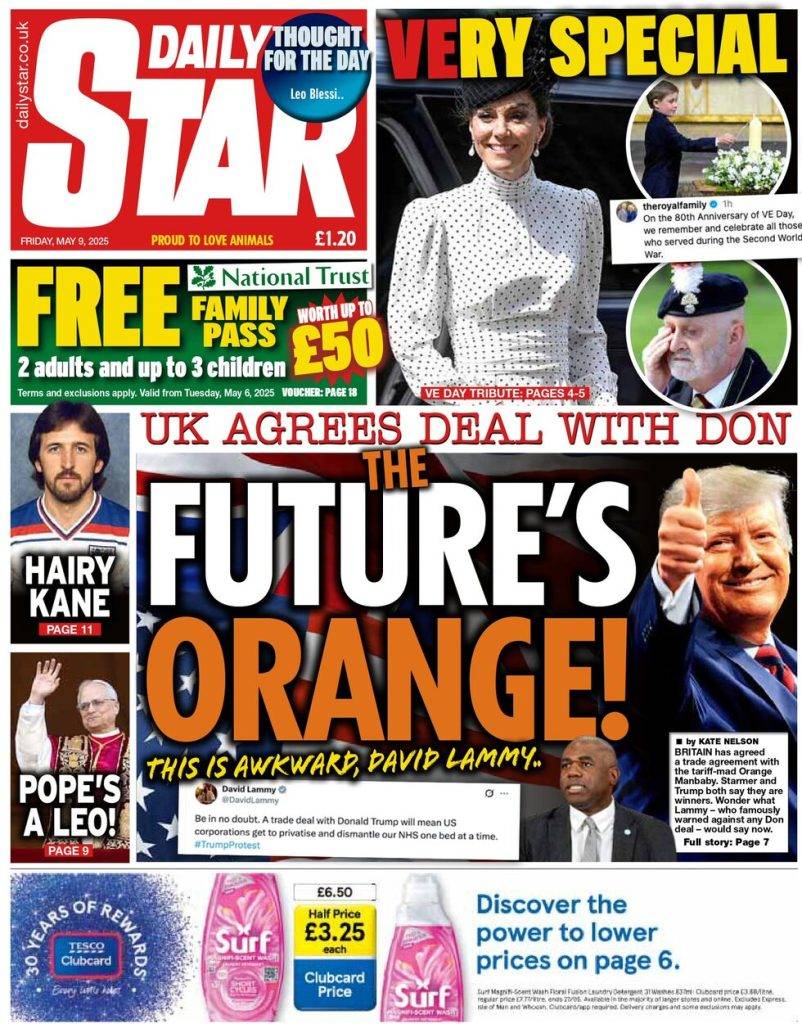
Subscribe to Updates
Get the latest creative news from FooBar about art, design and business.

